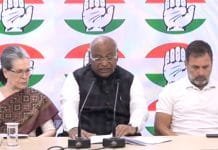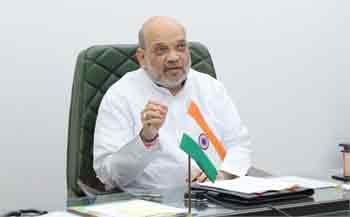Amit Shah Presents Three Key Bills in Lok Sabha Amid Opposition Uproar
The Monsoon Session of Parliament 2025 turned stormy on August 20, 2025, as Union Home Minister Amit Shah introduced three crucial bills in the Lok Sabha. The introduction of the 130th Constitution Amendment Bill, 2025, the Union Territories Government (Amendment) Bill, 2025, and the Jammu and Kashmir Reorganization (Amendment) Bill, 2025 ignited heated protests from the Opposition, leading to dramatic scenes inside the House. The bills were later referred to a Joint Parliamentary Committee (JPC) for detailed scrutiny.
Three Landmark Bills Introduced by Amit Shah
On Wednesday afternoon, Amit Shah presented the following three significant legislative proposals in the Lok Sabha:
The Constitution (One Hundred and Thirtieth Amendment) Bill, 2025 – introducing provisions related to holding constitutional office while facing grave criminal charges.
The Union Territories Government (Amendment) Bill, 2025 – seeking administrative changes in governance structures of Union Territories.
The Jammu and Kashmir Reorganization (Amendment) Bill, 2025 – proposing updates in the governance and legal framework of Jammu and Kashmir.
All three bills were officially referred to a Joint Parliamentary Committee following a motion moved by the Home Minister.
Objective of the Constitution Amendment Bill 2025
The most debated of the three bills was the Constitution (130th Amendment) Bill, 2025, which mandates that if the Prime Minister, any Union Minister, a Chief Minister, or a Minister of a Union Territory is arrested or detained on serious criminal charges, they must vacate their office.
If detention or custody extends beyond 30 consecutive days, the law requires immediate removal from office.
In cases where the leader does not voluntarily resign, the President, acting on the advice of the Council of Ministers, will have the authority to dismiss them.
The government has defended this bill as a necessary step to uphold constitutional morality, ethical governance, and public trust.
Opposition’s Fierce Protest
The Opposition benches erupted in protest the moment Amit Shah tabled the bills.
Congress MPs tore copies of the bill and hurled them toward the treasury benches.
Speaker Om Birla reprimanded the protesting lawmakers and warned against disrupting the dignity of Parliament.
Congress leader KC Venugopal launched a sharp attack, questioning Amit Shah’s moral standing by recalling his own arrest in earlier years. In response, Amit Shah emphasized that he had resigned from public office until acquitted by the courts, asserting that he never clung to constitutional authority during trial.
SP leader Ram Gopal Yadav voiced concerns that the government could misuse the bill to target political opponents by fabricating charges. He argued that “false and serious allegations” have become tools of political vendetta, warning that democracy itself was under threat.
Parliamentary Proceedings Marred by Chaos
The day’s proceedings witnessed repeated adjournments due to uproar:
11:05 AM – Lok Sabha adjourned till 12 noon after loud protests.
12:17 PM – House adjourned again until 2 PM following disruptions.
02:15 PM – Amit Shah formally moved the bills; Opposition tore documents and shouted slogans.
02:17 PM – House adjourned until 3 PM due to continued pandemonium.
03:03 PM – Proceedings resumed with strict warnings from Speaker Om Birla to maintain order.
Meanwhile, the Rajya Sabha also saw protests, particularly over issues linked to Bihar’s Special Investigation Report (SIR) and the government’s legislative agenda, including a bill concerning the Indian Institutes of Management (IIMs).
Amit Shah’s Defense of the Bills
In his address, Amit Shah defended the 130th Amendment Bill by highlighting its moral and ethical foundation.
“When I faced charges in the past, I resigned before my arrest and did not accept any constitutional position until proven innocent. This is what political morality demands,” Amit Shah asserted on the floor of the House.
He further emphasized that governance cannot be held hostage to leaders embroiled in serious criminal proceedings, and that the bill strengthens public confidence in democratic institutions.
Opposition’s Counterarguments
Opposition leaders, however, raised multiple objections:
Congress: Argued that the ruling party was using constitutional amendments to weaken federalism and target non-BJP state governments.
Samajwadi Party: Warned that innocent leaders could be framed under “false charges” and forced to resign, thereby destabilizing elected governments.
AIMIM’s Asaduddin Owaisi: Gave notices opposing all three bills, claiming that they undermine democratic freedoms and were being rushed without adequate consultation.
The INDIA bloc, comprising Congress and allied parties, convened a strategy meeting at Mallikarjun Kharge’s office in Parliament House to coordinate their protest.
The Role of the Joint Parliamentary Committee
The referral of the bills to the Joint Parliamentary Committee (JPC) is a critical step. This committee will examine the bills clause by clause, invite expert testimony, and potentially recommend modifications.
The JPC’s involvement ensures parliamentary scrutiny and debate beyond the initial uproar in the House.
While the government has projected this as a move toward transparency, Opposition parties fear that the committee will function under the influence of the ruling alliance.
Other Key Developments in Parliament
In addition to the three high-profile bills introduced by Amit Shah, the Monsoon Session also saw other notable developments on the same day:
Online Gaming Bill, 2025: Introduced in the Lok Sabha, this bill seeks to regulate real-money online gaming platforms after cabinet approval.
Bihar SIR Controversy: The Opposition raised repeated adjournment motions under Rule 267 regarding the constitutional and electoral impact of Bihar’s Special Investigation Report.
Rajya Sabha Proceedings: Adjourned multiple times due to protests, with Union Minister Dharmendra Pradhan introducing an IIM-related bill in the Upper House.
Political Implications of the Proposed Amendments
The Constitution Amendment Bill has wide-ranging implications:
It could reshape the accountability framework for top political leaders across the Union and States.
It places ethical standards above electoral power, demanding resignations in cases of prolonged custody.
However, concerns remain that such provisions could be weaponized to destabilize opposition-led governments by initiating criminal cases against their leaders.
The government argues this law will restore public faith in governance, while critics view it as a potential tool for central overreach.
Conclusion: A Defining Moment in India’s Democratic Evolution
The stormy debates surrounding the Constitution (130th Amendment) Bill, 2025, the Union Territories Government (Amendment) Bill, 2025, and the Jammu and Kashmir Reorganization (Amendment) Bill, 2025 underline the deep political fault lines in the country.
While the government maintains that these reforms are necessary for transparency and accountability, the Opposition fears they mark a shift toward authoritarianism. As the bills head to the Joint Parliamentary Committee, the coming weeks will determine whether they pass with consensus or fuel further confrontation inside and outside Parliament.
This legislative showdown is not just about the technicalities of governance—it is about the future direction of Indian democracy and the balance between constitutional morality and political power.













